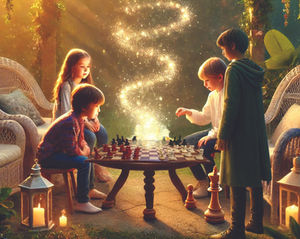The Wind of Divinity
- Javier Romano

- Apr 22, 2019
- 2 min read
Updated: Mar 9, 2025

Unlike traditional chess, Quaternity cannot be predicted in purely mathematical terms.
In this game, you are not required to rely solely on linear, logical thinking. A strong performance depends on the dynamic interplay between the two main functions of the brain—reason and intuition—along with something more.
This something more could be described as a kind of sixth sense, intuition, or even extrasensory perception (ESP)—a heightened awareness that aligns with what one might call the wind of Divinity (Kami-Kaze in Japanese).
This mysterious force, though ever-present, can manifest at any moment during the game, sometimes in striking ways, influencing players' intentions and dramatically shifting the course of play in unforeseen directions.
Being open and attuned to this intangible element can occasionally lead to victory—much like knowing how to harness the wind while sailing.
But here’s an intriguing question: if all four players were equally in tune with this force, who would emerge as the winner?
The reward of victory appears to be granted to the player who deserves it. But what exactly defines deserving, and—more importantly—who or what determines the final outcome?
The criteria for judgment may often seem obscure, even unfair, especially to those accustomed to predictable results based solely on logical performance.
However, it is undeniable that qualities such as patience, keen observation, presence of mind, genuine attention, adaptability, and fair play—alongside strategic and logical thinking—are crucial factors shaping the outcome.
Regardless of who wins, the intricate dynamics of this captivating game provide ample opportunities for honing perception, intuition, and higher awareness. At the same time, it remains a source of pure and refined entertainment—one that will continue to engage and delight players for generations to come.
J. Romano
♔♛








Comments